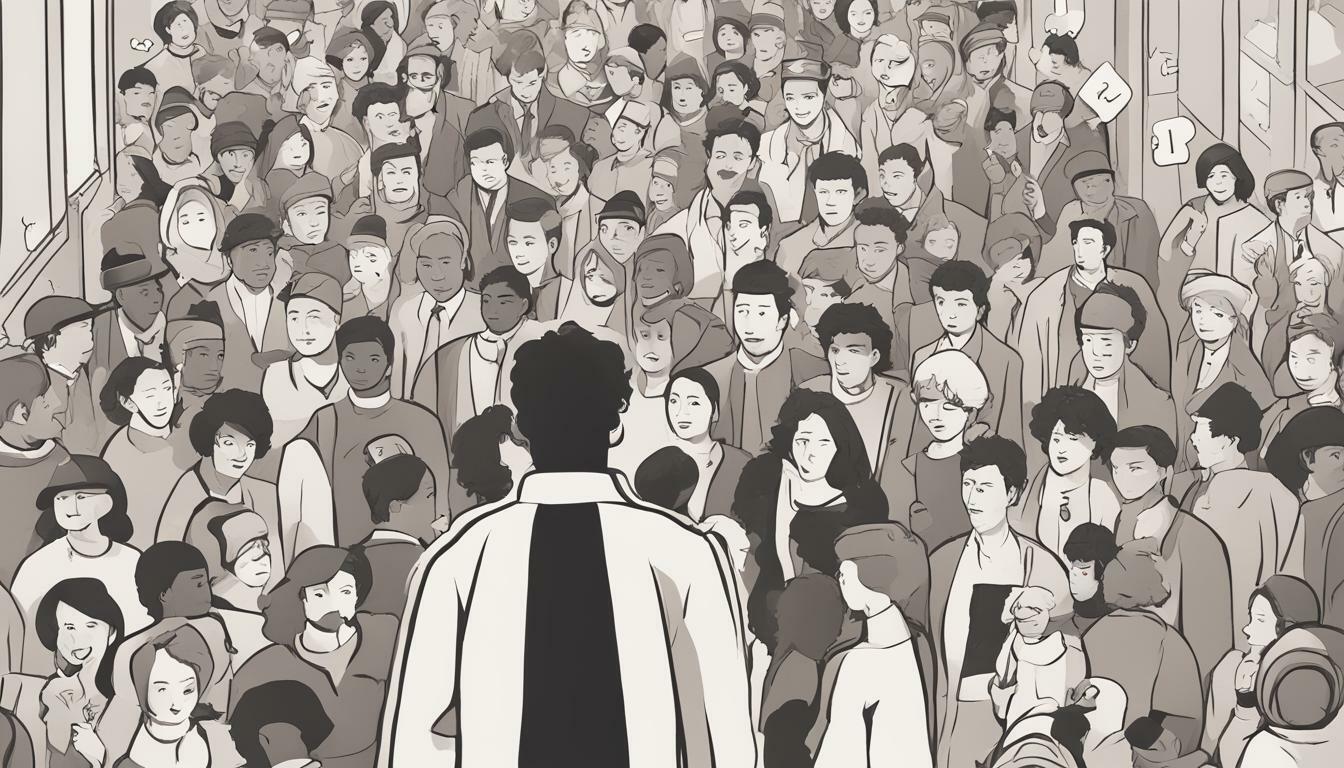It’s a common misconception that having friends automatically means we will never feel lonely. However, the reality is that many people experience feelings of loneliness even when surrounded by friends. This can leave us feeling confused and wondering why we feel this way.
Understanding the complexities of loneliness can shed light on why we may experience this emotion despite having friends. Social connection and friendship dynamics play a significant role in how we perceive our relationships and sense of belonging.
In this section, we will explore the multifaceted nature of loneliness and the factors that can contribute to feeling isolated despite having friends. We will discuss coping strategies for managing these feelings and cultivating a sense of connection and fulfillment in our lives.
Key Takeaways:
- Feeling lonely despite having friends is a common experience.
- Understanding the complexities of loneliness can provide insights into our emotions.
- Social connection and friendship dynamics are key factors in our sense of belonging.
- Coping strategies exist for managing feelings of loneliness and cultivating fulfillment.
Understanding Loneliness and Its Impact
Loneliness is a complex emotion that can be difficult to define. It is more than just the absence of physical company; it encompasses our emotional well-being and our social interactions. Loneliness can have significant psychological effects, affecting our mental health and overall quality of life.
| Definition of Loneliness | The feeling of being disconnected from others or the world around us, lacking a sense of belonging or social support. |
|---|---|
| Emotional Well-Being | Loneliness can contribute to negative emotions such as sadness, anxiety, and depression. It can also affect our self-esteem and self-worth. |
| Social Interactions | Meaningful social connections are vital to our emotional and physical health. Loneliness can lead to social isolation and a lack of social support. |
| Mental Health | Loneliness has been linked to increased risk of mental health concerns such as depression, anxiety, and suicide. |
| Psychological Effects | Loneliness can have a significant impact on our cognitive function, including memory and decision-making skills. |
Understanding the definition and impact of loneliness is essential in addressing it. It is crucial to prioritize meaningful social connections and seek support when necessary for our emotional and mental well-being.
The Dynamics of Friendship
Friendships can be complex relationships that require effort and understanding to maintain. It’s important to have realistic expectations of our friends and offer social support in return. Focusing on quality over quantity can also enhance the intimacy and depth of our friendships.
It’s common for friendships to change over time. Sometimes, they may require more effort or adapt to life transitions, such as moving or starting a new job. Maintaining communication and making time for each other can help preserve these connections.
Intimacy is an essential component of close friendships. However, it’s important to recognize and respect boundaries. Not everyone expresses intimacy in the same way, and it’s important to communicate and understand each other’s expectations.
Social support is critical in times of need. Being there for our friends in times of crisis can strengthen the friendship and provide a sense of comfort and security. It’s also important to seek support from our friends when we are going through a difficult time.
Ultimately, friendships are about finding a balance that works for both parties. It’s okay to have different levels of intimacy or different interests as long as there is mutual respect and effort to maintain the connection.
The Paradox of Social Media
Social media has brought people together in ways that were previously unimaginable. With just a few clicks, we can connect with friends, family, and acquaintances no matter where they are in the world. However, the impact of social media on our sense of connection is complex.
While we may have hundreds or even thousands of “friends” on social media, our online connections may not provide the same level of depth and intimacy as in-person relationships. Virtual friendships can be a poor substitute for real ones, and the pressure to present a certain image online can lead to feelings of comparison and inadequacy.
The fear of missing out (FOMO) is a common phenomenon on social media. Seeing posts about events, activities, or vacations that we were not invited to can foster a sense of exclusion and loneliness. Additionally, the constant barrage of information and stimulation on social media can leave us feeling overwhelmed and emotionally drained.
It is important to be mindful of the impact of social media on our emotional well-being and to take steps to manage its effects. This may include limiting our time on social media, unfollowing or muting accounts that make us feel negative emotions, and using social media as a tool to enhance, rather than replace, real-life connections.
Internal Factors Contributing to Loneliness
Loneliness can manifest from internal factors that affect our emotional well-being. Some of the common internal factors that contribute to loneliness despite having friends are self-esteem, introversion, self-isolation, fear of rejection, and self-worth.
Self-esteem is our perception of our own value or worth, which can vary depending on our experiences and circumstances. When we have low self-esteem, we may feel unworthy of meaningful connections and withdraw from social interactions. This can lead to feeling lonely, even if we have friends around us.
Introversion refers to a personality trait characterized by a preference for solitude and solitude-seeking activities. While introverts can have fulfilling friendships, their need for alone time can result in them feeling lonely despite having friends.
Self-isolation is the act of purposefully withdrawing from social interactions. This can be a coping mechanism during times of stress or anxiety. However, prolonged self-isolation can lead to feelings of loneliness and detachment from others.
Fear of rejection is a common emotional response to the possibility of being excluded, criticized, or dismissed. Fear of rejection can prevent us from reaching out to others and sabotaging our attempts at forming meaningful connections. This can lead to feelings of loneliness, even when we have friends around us.
Self-worth is our belief in our own value as a person. When we lack self-worth, we may feel undeserving of love and connection. This can lead to self-isolation and prevent us from nurturing our friendships, resulting in feelings of loneliness.
External Factors Contributing to Loneliness
Loneliness can be influenced by external factors, including life transitions, physical distancing, relocation, busy schedules, and a lack of shared interests with friends. These situations can make us feel disconnected from others and increase our sense of loneliness despite having friends.
Life Transitions
Life transitions such as starting a new job, moving to a new city, or going through a breakup can be overwhelming and isolating. Adjusting to these changes can take time, and during this period, we may feel disconnected from our support system and struggle to form new meaningful connections.
Physical Distancing
The COVID-19 pandemic has highlighted the impact of physical distancing on our social connections. Even before the pandemic, we may have experienced physical distance due to geographic barriers or busy schedules, limiting our ability to see our friends regularly and resulting in feelings of loneliness.
Relocation
Moving to a new place can be exciting, but it can also be challenging to make new friends and adjust to a new social environment. Our existing friendships may also be affected by the distance, making it difficult to maintain the same level of closeness and support.
Busy Schedules
A busy schedule can make it challenging to prioritize social interactions and maintain friendships. When work, school, or other commitments take up most of our time, we may feel like we don’t have enough energy or time to socialize, resulting in a sense of isolation from others.
Lack of Shared Interests
Having friends who share our interests and hobbies can enhance our sense of connection and belonging. However, when we don’t share common interests with our friends, we may struggle to find ways to connect and may feel left out or disconnected.
Coping Strategies for Loneliness
Feeling lonely can be difficult, but there are strategies we can employ to manage these emotions and cultivate a sense of connection and fulfillment in our lives. Here are some coping strategies to consider:
Self-reflection
One powerful tool for managing loneliness is self-reflection. Take some time to examine your feelings and identify any patterns or triggers that may be contributing to your loneliness. Consider keeping a journal to track your emotions and experiences. This can help you gain insights into yourself and develop a greater sense of self-awareness.
Seeking support
It’s important to remember that you don’t have to go through feelings of loneliness alone. Reach out to friends or family members and share how you are feeling. Alternatively, consider seeking support from a mental health professional. Therapy or counseling can provide a safe and supportive environment to explore your feelings and develop coping strategies.
Cultivating new relationships
Meeting new people and cultivating new relationships can be a great way to combat loneliness. Joining a club or group centered around a shared interest can provide opportunities for social connection. Additionally, consider volunteering or participating in community events to meet new people.
Self-care
Taking care of yourself is essential for managing feelings of loneliness. Ensure that you are getting enough rest, eating well, and exercising regularly. Make time for activities that you enjoy, such as reading a book or taking a walk in nature. Prioritizing self-care can help boost your emotional well-being and reduce feelings of loneliness.
Engaging in activities
Engaging in activities that bring you joy can be another effective strategy for managing loneliness. Consider pursuing a new hobby or revisiting an old one. Take a class or attend a workshop to learn a new skill. Participate in social activities, such as game nights or outings with friends. Engaging in activities can provide a sense of purpose and fulfillment, and help you connect with others who share your interests.
Conclusion
Understanding loneliness when we have friends can be challenging, but it is important to know that it is a common feeling. We have explored the various factors that contribute to loneliness, including internal and external factors, and the paradoxical impact of social media.
Friendships are essential to our emotional well-being, and we should focus on quality over quantity to maintain meaningful connections. Coping with loneliness requires self-reflection, seeking support, cultivating new relationships, practicing self-care, and engaging in activities that bring us joy and fulfillment.
It is crucial to recognize that feeling lonely does not have to be a permanent state, and we have the power to take steps towards creating a sense of connection and fulfillment in our lives. By implementing the coping strategies discussed and understanding the dynamics of friendship, we can navigate our emotions and find a sense of belonging.
FAQ
Q: Why do I feel lonely even though I have friends?
A: Feeling lonely despite having friends can be a complex emotional experience. There are various factors that can contribute to this feeling, such as unmet expectations in friendships, a lack of social support, or a desire for deeper connections. It’s important to recognize that loneliness is not solely determined by the number of friends we have, but rather the quality of those relationships and our individual needs for social connection.
Q: How can I cope with loneliness?
A: Coping with loneliness involves self-reflection, seeking support from friends or professionals, and actively engaging in activities that bring us joy and fulfillment. Taking the time to understand our own emotions and needs, reaching out to others for support, and finding ways to engage in meaningful interactions can help alleviate feelings of loneliness and foster a sense of connection.
Q: What impact does social media have on loneliness?
A: Social media can have a paradoxical impact on feelings of loneliness. While it provides opportunities for virtual connections, it can also contribute to feelings of isolation and loneliness. Comparing ourselves to others, fear of missing out (FOMO), and relying too heavily on online interactions can all contribute to a sense of disconnection. It’s important to use social media mindfully and also prioritize in-person, meaningful connections.
Q: What are some external factors that can contribute to loneliness?
A: External factors such as life transitions, physical distancing, relocation, busy schedules, and a lack of shared interests can all contribute to feelings of loneliness. Changes in our circumstances or environments can disrupt our social connections, making it important to be proactive in seeking new opportunities for social interaction and connection.
Q: How can I enhance and maintain meaningful friendships?
A: Focusing on quality over quantity is key to enhancing and maintaining meaningful friendships. Prioritizing open communication, offering support, and nurturing shared interests can help strengthen friendships. It’s also important to be understanding and accepting of the natural ebbs and flows that occur in friendships, allowing them to evolve and grow over time.
Q: What role do internal factors play in feelings of loneliness?
A: Internal factors such as self-esteem, introversion, self-isolation, fear of rejection, and self-worth can all contribute to feelings of loneliness. Understanding and addressing these internal factors through self-reflection and self-care can help improve our emotional well-being and promote a sense of connection with others.
Q: How can I navigate loneliness during life transitions?
A: Life transitions can often bring about feelings of loneliness. It’s important to acknowledge and validate these emotions while also seeking support from friends, family, or professionals. Engaging in new activities, joining social groups related to your interests, and reaching out to others in similar circumstances can help ease the sense of isolation during these times.
Q: What can I do if I feel lonely despite having friends?
A: If you feel lonely despite having friends, it may be helpful to examine the dynamics of your friendships and consider if there are any unmet needs or expectations. It can also be beneficial to explore new avenues for social connection, such as joining clubs or organizations, volunteering, or attending social events. Seeking professional help or support groups can also provide valuable insights and strategies for addressing feelings of loneliness.





